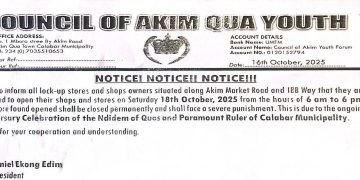Asuquo Cletus
In an era where sensationalism often trump over substance, the recent attempt to politicize a grieving family moment in Akwa Ibom State represents a troubling narrative.A private video captured shortly after the painful passing of Governor Umo Eno’s wife has resurfaced on social media, manipulated and reinterpreted in a bid to discredit the administration. At the center of it all is a grieving child, mourning her mother, who happens to be the daughter of the governor in what should have remained a deeply personal and protected moment.
The timing of the video’s resurgence if by anything to go by is not accidental. It coincides with the second anniversary of Governor Eno’s administration, a period marked by the commissioning of developmental projects across the state under the ARISE Agenda.
From rural roads and health facilities to education and agricultural initiatives, the governor’s achievements are visible and widely acknowledged. That this video would suddenly be revived in such a politically charged manner suggests a deliberate strategy, one rooted in desperation rather than democratic engagement.
Governor Eno has responded with restraint and clarity. He acknowledged the incident, reaffirmed his family’s unity, and urged the public not to allow political opportunism to disturb the memory of his late wife or further burden their children.
His words, “Let us not revive sorrow for political amusement,” are not only a plea for dignity, but also a sharp indictment of those who seek to score points by exploiting tragedy.
This latest episode is part of a larger and increasingly dangerous pattern in Nigerian politics the preference for emotional manipulation over policy debate. Instead of engaging on governance records, some opponents rely on distortion and personal attacks, hoping to distract the public from tangible results.
This tactic, while effective in short-term optics, erodes public trust and undermines the very essence of democratic discourse.
The role of “pastorpreneurs” in this drama cannot be ignored. These self-styled religious figures, who blur the lines between faith and politics, often serve as echo chambers for unfounded accusations, cloaking propaganda in piety. Their involvement in this smear campaign only further highlights how far some are willing to go to derail the narrative of progress.
What should be of greater public interest is the ongoing transformation within Akwa Ibom. Governor Eno’s administration has, in two years, prioritized infrastructural renewal, rural development, education, healthcare, human capital empowerment, and agricultural productivity. These initiatives have reached all 31 local government areas, and for many citizens, they represent real, life-improving change. Rather than distort the record, political actors should either offer constructive alternatives or simply respect the will of the people.
Social media has undeniably given voice to the masses, but it has also become a breeding ground for misinformation. As citizens, we must cultivate discernment and resist the temptation to share unverified narratives. Our political discourse must return to issues facts, results, and ideas not rumors, grief, or emotional blackmail.
Politics will always involve opposition and critique, people with dissenting voices, that is healthy for democracy, it is it beauty but the line must be drawn at exploiting a child’s pain and a family’s loss for political gamesmanship. There is a moral cost to such actions that society cannot afford to normalize.
Akwa Ibom has a rare chance to build on its current trajectory of stability and inclusive growth. It must not allow the politics of distraction to cloud its vision or steal its momentum. Let us rise above the noise and focus on what truly matters governance, dignity, and progress.
























